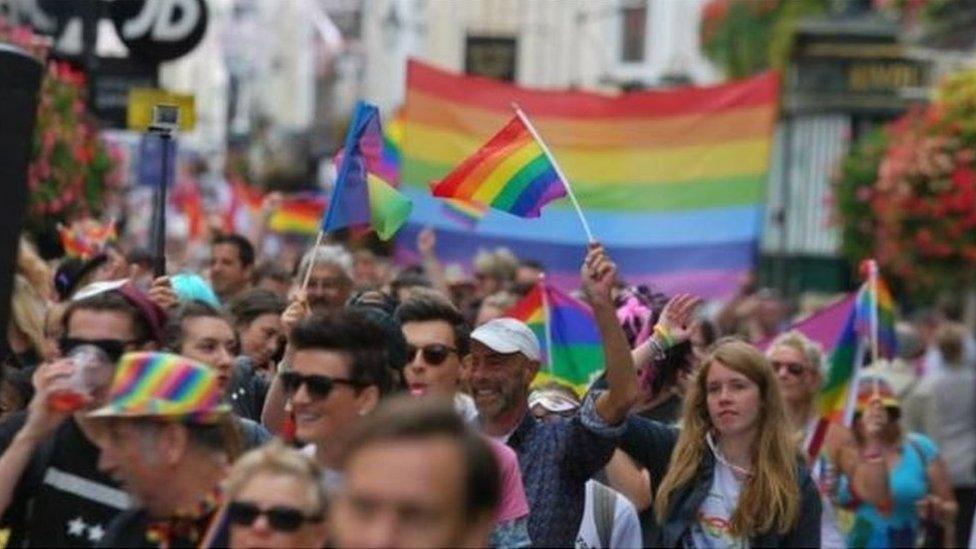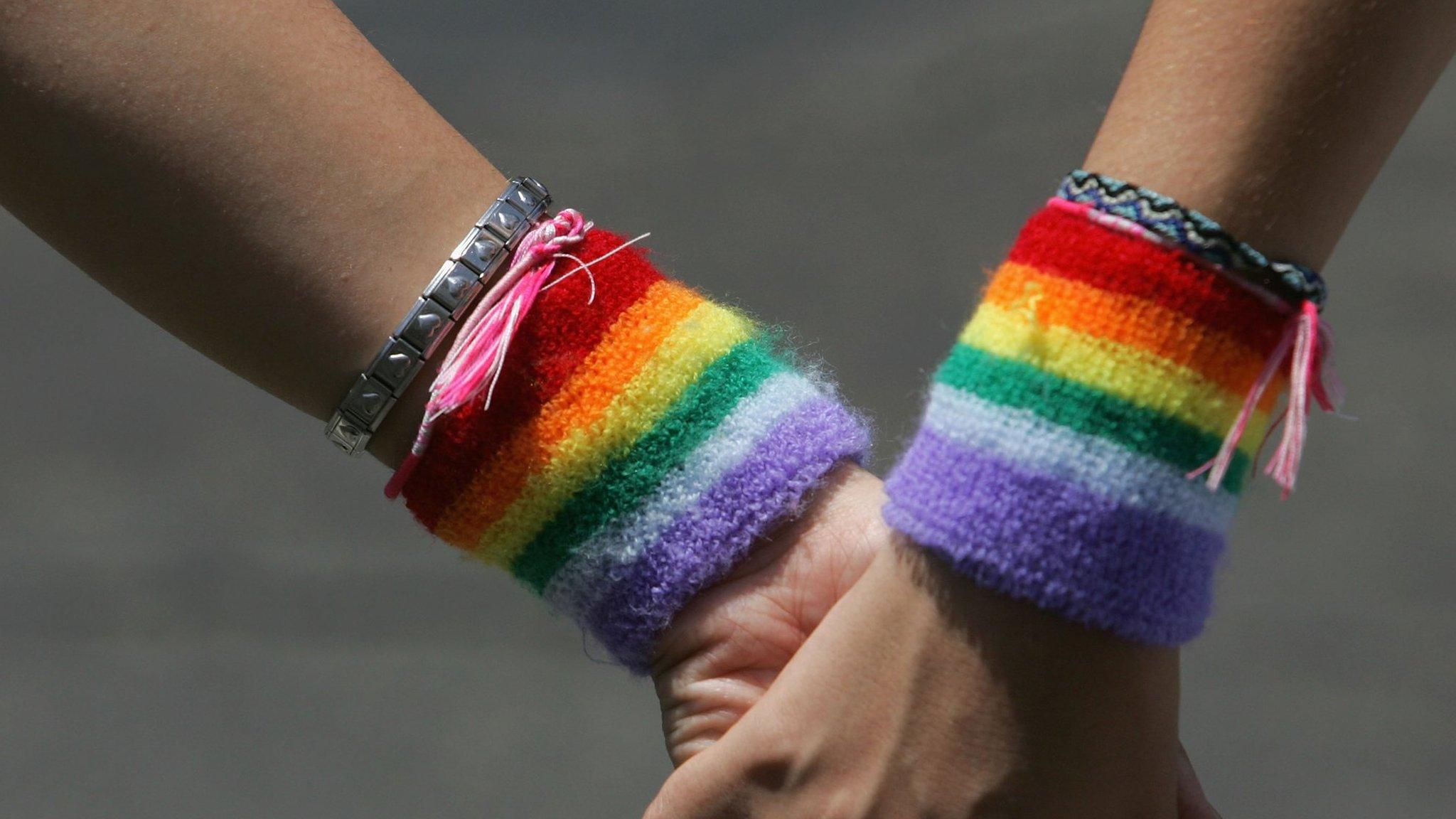Abortion and same-sex marriage votes 'breach devolution' - DUP
- Published

Votes by MPs to legalise same-sex marriage and liberalise abortion law in Northern Ireland breach the devolution settlement, the Democratic Unionist Party has said.
MPs debated the changes on Tuesday.
Same sex-marriage is not legal in Northern Ireland and abortion is only allowed in limited circumstances.
While the votes do not automatically change the law, they compel government to make the changes if devolution at Stormont is not restored by 21 October.
The DUP said the votes make it more difficult to restore its power-sharing government with Sinn Féin that collapsed in January 2017 amid a bitter row.
Tuesday's votes came as part of the debate about a bill aimed at keeping Northern Ireland running in the absence of devolved government.
MPs backed the same-sex marriage amendment by 383 votes to 73, while the abortion amendment was backed 332 to 99.

Analysis: Crucial caveat to law change
By Jayne McCormack, BBC News NI political reporter
Campaigners for same-sex marriage in Northern Ireland say this is a watershed moment.
Others may see it as the biggest step yet by Westminster towards enacting direct rule.
But it does not automatically change the law - the caveat is that it can only happen if Stormont hasn't been restored by 21 October.
Read more from Jayne here.

Sir Jeffrey Donaldson, the DUP's Lagan Valley MP, said the votes meant there was "very little incentive for Sinn Féin to restore devolution".
The socially-conservative DUP has opposed any change to same-sex marriage and abortion law in Northern Ireland, while Sinn Féin has supported reform on both issues.
'Responsibility to legislate'
"It's quite ironic for an Irish republican party to argue that the British Parliament is the proper place to deal with very sensitive legalisation, very sensitive matters," said Sir Jeffrey.
The DUP's Sir Jeffrey Donaldson and Sinn Féin's Conor Murphy have opposing views on the Westminster move
"[The DUP] believe the purpose of devolution is to allow the different parts of the UK to make laws that are appropriate for that part of the country."
Sinn Féin's Conor Murphy welcomed the vote result, but added it was not delivered in the way his party would have preferred.
"The government with jurisdiction has responsibility to deliver rights if the devolved institution is denying those rights," he said.
"If the DUP continue to deny rights then Westminster has a responsibility to legislate for these matters.
"It's not our preference but it is in the Good Friday Agreement."
BBC News NI looks at the history of Northern Ireland's same-sex marriage debate
Grainne Teggart, from the human rights organisation Amnesty International, said Parliament's will was clear and work must start on legislation that "finally respects women's rights".
"At a time when prosecutions are a reality in Northern Ireland, when a mother is facing criminal trial for obtaining abortion pills for her then-15-year-old daughter, this can't come quick enough," she added.
Anti-abortion protester Bernie Smyth said it was a "disgrace" that MPs had decided to "override the democratic process" in Northern Ireland.
"We've been working very hard to protect the unborn child," she said. "To see something change so dramatically is unbelievable."
'Not straightforward'
Northern Ireland Human Rights Commissioner Les Allamby said that whilst amendments on same sex-marriage were straightforward and could easily be implemented on 22 October in the absence of devolution, the situation with abortion legislation is much more difficult and complex.
He said: "The important thing on this - knowing that we took nine years and several court cases to agree guidelines - is that you would want the secretary of state to lay out a pathway and timetable to become human rights compliant."
Mr Allamby said he did not envisage that the amendment, brought by Labour MP Stella Creasy, meant "abortion on demand".
Instead, he called it a significant step towards decriminalisation.
What happens now?
If the Northern Ireland Assembly has not been restored by 21 October, the government must bring regulations to Parliament to amend the law in Northern Ireland.
There would not have to be a further vote on the matter as it would come in the form of secondary legislation that would not be put to a vote in the Commons.
The bill still has to go to the House of Lords for approval but it is highly unlikely it would be overturned there.
The law on abortion in Northern Ireland explained
Number 10's former legislative affairs director Nikki Da Costa said MPs could ask for a resolution to overturn it but given the majority in favour of the amendment that seemed unlikely to happen too.
The DUP voted against both amendments but two of its MPs - Sir Jeffrey and Gavin Robinson - were tellers, meaning they did not vote.
The independent unionist Lady Hermon, who represents the North Down constituency, backed the same-sex marriage amendment, as did Northern Ireland Office Minister John Penrose.
Northern Ireland Secretary Karen Bradley and Prime Minister Theresa May abstained.

Timeline of same-sex marriage
England and Wales legalised same-sex marriage in July 2013, with the change coming into force in March 2014
Scotland legislated for same-sex marriage in February 2014 and it came into effect in December that year
The Republic of Ireland legalised same-sex marriage in a referendum in May 2015, becoming the only country in the world to do so by popular vote
Ireland's first same-sex marriage took place in November 2015
- Published10 July 2019

- Published29 July 2017

- Published8 July 2019
